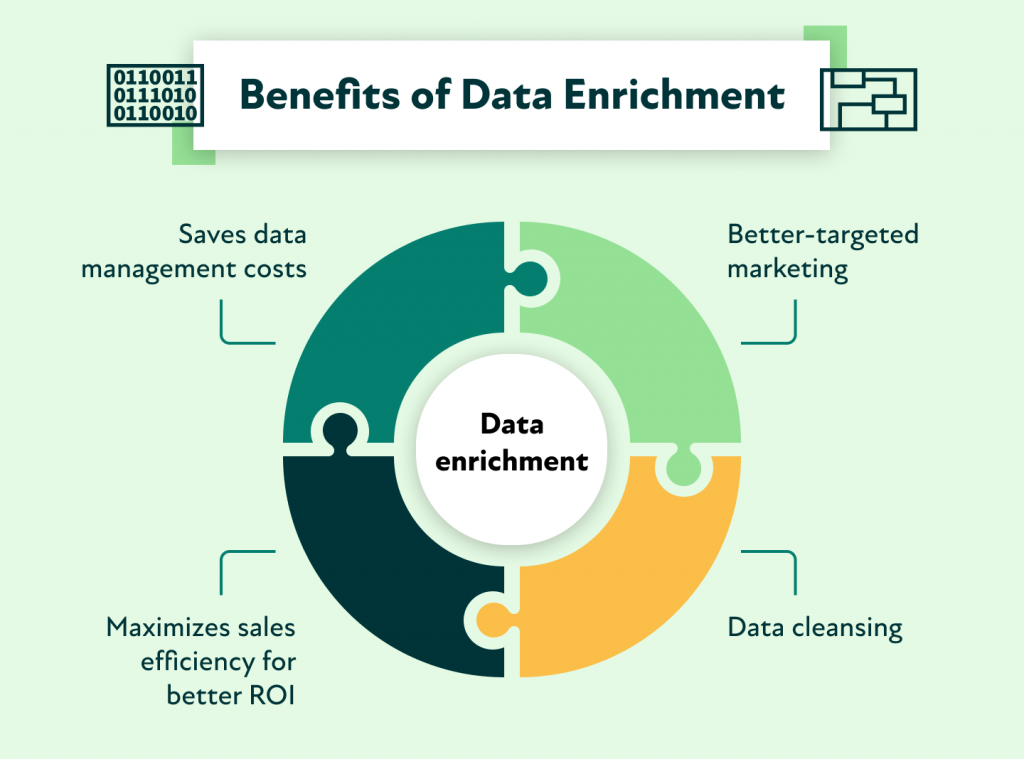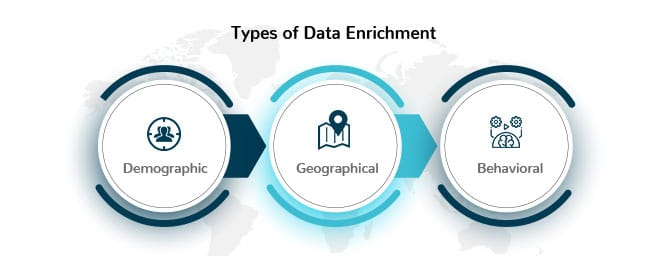What is data enrichment? Types, benefits & use cases
For today’s organizations, relying on basic details like names and emails isn’t enough. They need more meaningful insights to understand their customers better, run better campaigns, and make smarter business decisions.
Enhancing existing records with additional information, such as company size, industry, purchase history, or location, allows businesses to build complete, accurate customer data profiles. This enriched customer data can power more precise lead scoring, targeted marketing, and personalized customer experiences.
This article covers everything you need to know about data enrichment: What it is, its benefits, the different types, and common use cases.
What is data enrichment?
Data enrichment involves improving existing data by adding relevant details from internal or external sources. It turns basic records into comprehensive, precise profiles to boost their usefulness in marketing, sales, and customer service applications.
Data enrichment vs data cleansing vs data wrangling
Data cleaning, data wrangling, and data enrichment are often confused, but they serve different purposes.
Benefits of data enrichment
Enriching data impacts how effectively organizations can market, sell, and serve customers. It refines segmentation, boosts conversions, and improves the overall business value of records, which offers benefits throughout the customer lifecycle.

Data enrichment helps businesses understand what each customer likes and needs. Instead of sending the same ads to everyone, companies can use this richer data to create messages and offers that feel more personal and relevant.
Segmentation helps marketers focus on specific groups with tailored messages. By adding third-party data such as purchase intent or app usage, data enrichment expands targeting options and reveals new customer segments.
By adding only valuable external inputs rather than storing irrelevant internal data, data enrichment reduces database costs and frees up resources for revenue-driving projects.
Outdated contact lists drain budgets and reduce ROI. Data enrichment ensures accurate, up-to-date records, opening up more potential cross-sell and upsell opportunities and improving sales efficiency.
Types of data enrichment
There are many different types of data enrichment; however, the following are the most commonly used:
- Socio-demographic enrichment
- Geographic data enrichment
- Behavioral data enrichment (Purchase intent)
- Usage-based enrichment

Socio-demographic enrichment
Demographic enrichment involves information such as:
- Age
- Gender
- Income
- Education
- Marital status
- Occupation
- Location
Teams can use this information to:
- Support geo-targeting
- Guide lifecycle messaging
- Determine purchasing power
- Ensure relevance, tone, and inclusivity
- Assess decision complexity
- Identify life stages, schedules, and professional needs
For example, insurance providers often consider financial indicators like credit scores and asset ratios to set homeowner premiums. On the marketing side, they can use age, location, and other demographic information to tailor messaging and improve sales efforts.
Geographic enrichment
Location-based enrichment involves adding location-based details to an existing dataset, such as:
- ZIP codes: Support local targeting and delivery planning.
- Population density: Guide urban versus rural strategies.
- State / Region: Identify regional trends and preferences.
- Geographic conditions: Apply in territory mapping and coverage analysis.
Using this information, online retailers can compare potential store locations and estimate customer demand. This allows organizations to make smarter, more informed decisions about growth, development, and marketing strategies.
Behavioral data enrichment (Purchase intent)
Intent- or behavior-based enrichment predicts customer purchase likelihood based on previous actions, such as purchase history, browsing activity, and shopping data, which show buying patterns, interests, and preferences.
For example, e-commerce brands can use behavioral enrichment to run targeted campaigns for users who repeatedly view a product, nudging them toward completing a purchase.
Usage-based enrichment
Application usage enrichment adds insights about the apps, devices, and systems customers use, such as:
- Installed or frequently used apps: Reveal user habits and brand preferences.
- Operating systems: Indicate platform compatibility (iOS, Android, Windows, etc.).
- Devices: Show whether customers access via mobile, desktop, or tablet.
A gaming company can use application usage enrichment to identify players who prefer mobile over desktop, enabling better in-app experiences and more targeted marketing.
Data enrichment use cases
From improving lead capture to restoring old contacts, data enrichment helps organizations turn simple records into relevant business insights, so they can work smarter, target better, and close more deals.
Identify and eliminate form fields
Before you can enrich data, you have to capture it.
The shorter and simpler the contact form, the more likely people are to complete it. It’s best practice to ask for only the essential information, such as name, email address, and company. Now organizations can keep forms as straightforward as possible, and use data enrichment techniques to go back and fill in additional details after their submission.
Asking for too much information can leave you with none. For instance, just requiring a phone number can significantly lower form completion rates. With data enrichment, businesses can just ask for the basics and fill in the rest later. By making forms more straightforward to complete, data becomes easier to obtain.
Segment and arrange your data
Organizations use data enrichment to clean up messy, incomplete lead data, which helps businesses focus on what's really important.
After enrichment, they can organize leads into segments based on shared characteristics like industry, company size, or geographic region. These segments are then used to create targeted email lists and ad audiences for more focused outreach.
Enhanced personalization
Personalized communication boosts engagement and results. Data enrichment provides insights into customer preferences, enabling tailored, relevant messages that foster stronger connections. For example, an online retailer used enriched data to identify past purchases and send targeted recommendations, increasing click-through and conversion rates.
More efficient lead scoring
Not every lead is ready to buy, so it’s essential to know which ones to prioritize. Lead scoring uses data like website visits, email clicks, or content downloads to rank leads by their level of interest. With enrichment, you can add extra details such as job role, company size, or funding that make scoring more accurate.
Manual lead scoring is slow and tedious. Data enrichment makes this faster by adding extra details about customers, helping sales and marketing teams focus on the best leads and turn more of them into users.
This helps sales teams focus on the most promising opportunities instead of wasting time on cold leads. For example, a software company enriched its lead list with job titles. Leads marked as “IT Managers” scored higher because they were more likely to make purchase decisions, helping sales close deals faster.
Monitor and recognize business signals
A business signal is an action such as raising funds, making management changes, hiring new staff, or opening a new office. These signals suggest that a lead may be ready to buy.
With data enrichment, this signal information can be gathered from the company’s news sources or social media and added directly to your contact database. These signals help you time your pitch better and create more personalized outreach. For example, a furniture company noticed through enrichment that a business is opening a new office. They may reach out with setup offers and win the deal.
Give dead leads a second chance
Leads that once seemed uninterested may now be ready to buy. Although budgets, requirements, and decision-makers often change, old contact lists still have value. By adding new information to old data, you can update these records and bring them back to life as fresh prospects.
For example, a real estate agency enriched an old list of prospects and found several people had recently moved, creating new opportunities for property sales.
Data enrichment strategies (powered by Fivetran)
Fivetran simplifies the enrichment process by automating the movement, integration, and preparation of data from multiple sources. It eliminates silos, adds external context, and ensures reliable pipelines. With enriched, unified datasets, teams can improve segmentation, optimize operations, and move faster.
Here are four key ways Fivetran powers data enrichment for smarter, faster business outcomes:
- Unify legacy systems: Automatically extract and consolidate siloed operational data into a centralized view.
- Refine customer segmentation: Add context to customer profiles for more precise segmentation and targeting.
- Streamline pipeline maintenance: Use real-time and historical signals to model data risk and trigger proactive interventions.
- Speed up KPI reporting: Convert raw data into automated reports and dashboards.
Enrich your data pipeline with Fivetran
With Fivetran, your data team gets instant access to complete, reliable data. Automated customer data enrichment allows for accurate lead scoring, routing, segmentation, and reporting.
Fivetran integrates with your go-to tools, unifies distributed teams, and eliminates wasted time on manual entry. A fully managed, automated data movement platform, it quickly and reliably enriches, cleanses, wrangles, and prepares data without the engineering overhead that comes with many tools.
[CTA_MODULE]
Related posts
Start for free
Join the thousands of companies using Fivetran to centralize and transform their data.








